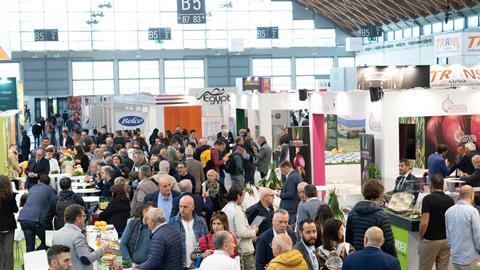The Italian fresh produce exhibition is set to host a special Egyptian pavilion, organised by Expolink, the Egyptian Exporters Association
Expolink, the Egyptian Exporters Association (EEA), is organising the Egyptian pavilion at fresh produce trade exhibition Macfrut, which takes place in Rimini on 8-10 May.
It will host 30 Egyptian producers and major exporters, displaying the finest, high-quality products including fresh fruits and vegetables; herbs and spices; phytosanitary products and fertilizers; packaging materials; pulses and grains; and dried fruits.
Its aim is to explore and penetrate new potential markets. It will not only showcase Egypt’s strategic location as a leading procurement destination in the international agricultural produce scene, but also demonstrate the diversity of the country’s fresh produce.
Egypt’s agricultural sector is a vital pillar of the economy, employing millions and contributing significantly to the country’s exports. Among its key products are a variety of fruits and vegetables, prized for their quality and freshness.
Growth trend
The sector has seen significant growth in recent years, with increased production and diversification. Egyptian fruits and vegetables are exported to various countries worldwide, with the Arab Gulf region, the European Union, and Russia being the top destinations.
These markets value Egyptian produce for its competitive prices, favourable growing conditions, and consistent quality.
Agricultural exports of fresh produce rose by one million tonnes in 2023 to reach a record 7.4m tonnes, generating US$3.7bn.
Egypt exported a total of 406 agricultural products to 160 markets in 2023, an increase of 93 destinations on the previous year. This included two million tonnes of citrus, 950,000 tonnes of potatoes, and 412,000 tonnes of onions.
Agricultural exports include citrus, potatoes, onions, grapes, tomatoes, sweet potatoes, strawberries, guava, garlic, mangoes, watermelons, and pomegranates.
Egypt has ranked first among orange exporters and third for strawberries since 2020.
Last year, EU wholesale onion prices increased by more than 400 percent as global shortages – the result of a variety of factors including floods in Pakistan, droughts in North Africa and the war in Ukraine – forced producing countries to prioritise domestic supply.
Egypt itself introduced a three-month ban on onion exports, which ended in March 2024. Egypt produces more than three million tonnes of onions each year, exporting around one-third of that total.
Action on logistics
The Egyptian government is taking steps to address logistics challenges by investing in infrastructure development, promoting cold chain logistics, and facilitating market access.
There is no doubt that Egypt has a unique strategic location that qualifies it to be a global centre for trade and logistics services.
The Egyptian government has developed a comprehensive strategy to transform the country into an international hub, one which connects Asia, Africa, and Europe.
Egypt recently signed an agreement with Italy for cargo transport between the ports of Damietta and Trieste, with a roll-on/roll-off service that offers capacity for 420 trucks every week.
The operation of this line will increase the economic feasibility of high-speed train projects that connect the Mediterranean to the Red Sea, as the European states will be connected to Asian and African countries through Egyptian territory.




